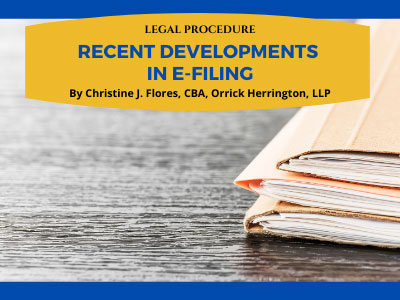
By Christine J. Flores, CBA, Orrick Herrington & Sutcliffe, LLP
Those of us working in litigation practice are well-aware that electronic filing in most courts is now required. State Courts utilize vendors for this task, and the Federal Courts utilize the CM/ECF system. All Courts have their own guidelines and local rules which guide us in using these systems and getting our documents properly docketed. And, like every other part of our lives in the COVID world, electronic filing practices have been modified.
Many Courts have revised their requirements for Chambers Copies – some courts requesting Chambers Copies only for longer documents. Some courts are eliminating that requirement altogether. In some cases, each Judge has a different requirement. It is always wise to check any given Court’s website for the current local rules. The requirements of any given Judge can also be found on the Court’s website.
We are all concerned about cybersecurity breaches, and the Courts have not been spared from this invasion. Recently the Judiciary has found it necessary to implement new procedures to safeguard sensitive court records. This year the federal courts added new security procedures to protect these confidential documents that are filed with the courts. In mid-December 2020, the Department of Homeland Security’s Cybersecurity and Infrastructure Security Agency issued an emergency directive regarding a known compromise. The Administrative Office of the U.S. Courts (AO) immediately notified the courts of this development. In January 2021, new procedures were announced by the AO. These procedures allow highly sensitive documents to be filed in paper form or via a secure electronic device, such as a thumb drive. These documents will be stored in a secure stand-alone computer system. The documents will not be uploaded to CM/ECF.
The courts are developing their procedures, and some have already issued general orders regarding their procedures for the filing of highly sensitive court documents. These procedures are expected to specify which documents are highly sensitive.
If you find yourself working on a filing which involves the submission of documents under seal, please be sure to review the most current requirements of the court that you are filing in. This will be time well-spent as you work to keep sensitive client information confidential.
Categorized in: Legal Procedure
| << previous | next >> |








